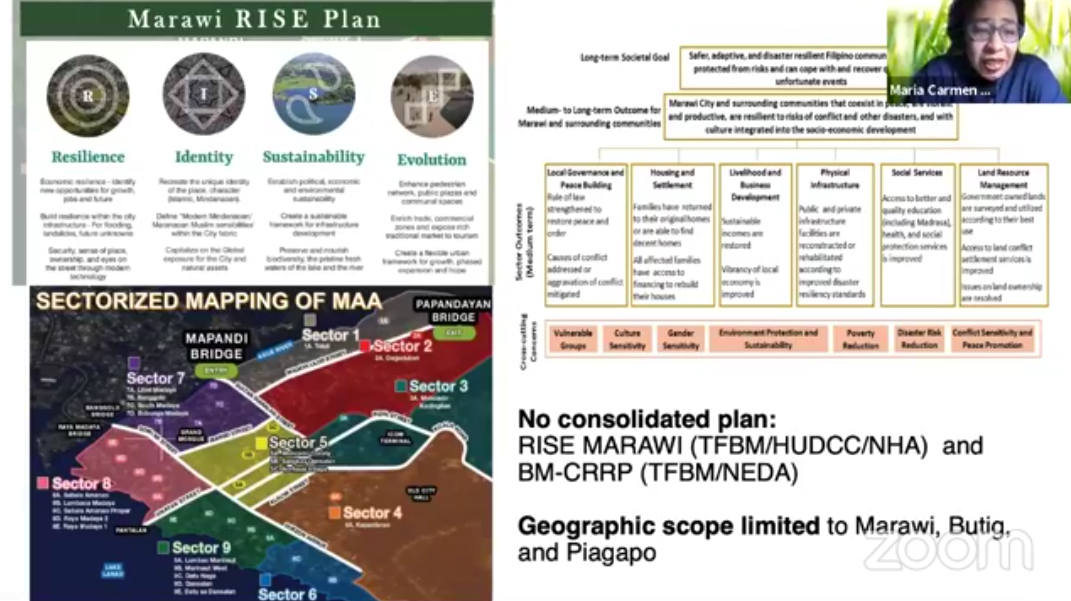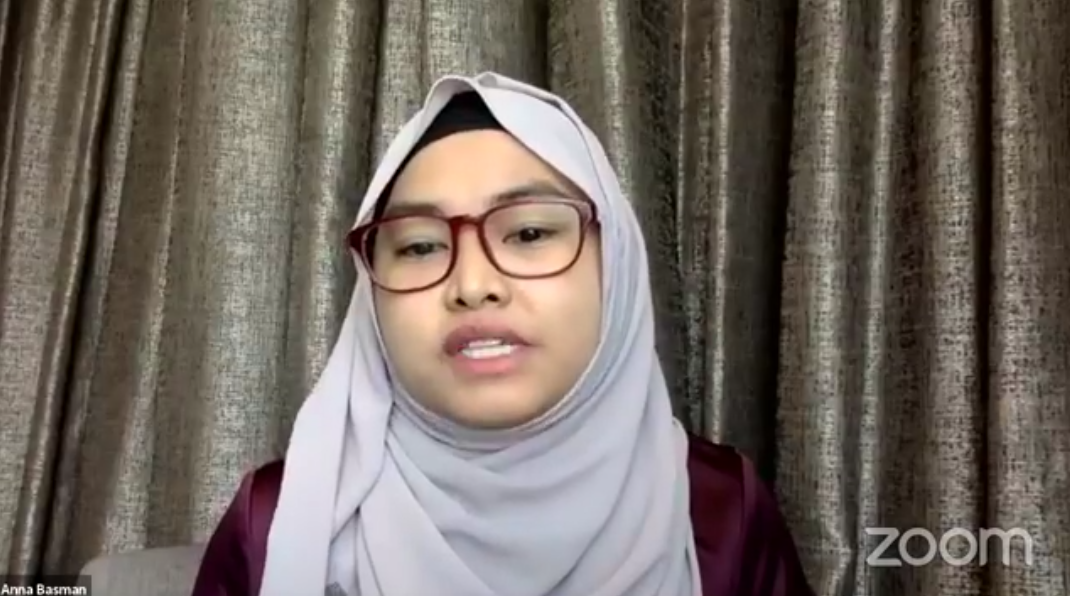Four years after the armed conflict in Marawi displaced thousands of people, the journey back home still seems to be far from reality despite the December 2021 deadline of Task Force Bangon Marawi (TFBM) to rehabilitate the war-torn city.
Aside from rebuilding the physical infrastructure, several factors such as transparency in the budget, lack of data, and failure to assess the damage properly affect the reconstruction of Marawi and the other affected areas, according to research conducted by civil society organizations (CSOs).
Beyond physical infrastructure

Fernandez discusses the government’s plans on Marawi rehabilitation.
Maria Carmen Fernandez, author of INCITEGov's upcoming report on the status of the Marawi reconstruction and rehabilitation, pointed out that the government lacks a unified, consolidated plan to guide its reconstruction efforts.
“[They] divided the plans into two: the RISE (Resiliency, Identity, Sustainability, and Evolution) plan and the Bangon Marawi Comprehensive Rehabilitation and Recovery Program (BM-CRRP) of the National Economic and Development Authority,” Fernandez explained. The former focuses on the 24 barangays within the most affected areas (MAA), while the latter covers those outside the MAA.
Such fragmentation made the implementation and evaluation of rehabilitation programs difficult and affected public and private sector investments.
Moreover, Fernandez stressed that the government’s rehabilitation program should also “go beyond physical form” and look into the different contexts of the crisis.
Bangsamoro Transition Authority member Anna Tarhata Basman agreed with Fernandez's view, saying the focus on the physical reconstruction of Marawi overlooked the needs of the internally displaced persons (IDPs).
TFBM's decision to finish all “horizontal and vertical” infrastructure in the MAA first delayed the IDPs’ return to their homes, Fernandez pointed out.
“Meaning, they have to demolish, clean first, do all these things. Only after the roads have been widened will the people be allowed to return,” she said.
In addition, Fernandez said the lack or mismatch of data on the IDPs and the cost of damage are also factors in the delivery of proper services for the IDPs.
“Even before the crisis, [the Maranaos are] some of the most mobile in the Philippines. So many of the people who were affected by the crisis are no longer in Marawi. I’ve spoken to some in NCR, in Baguio, and even displaced by the Taal Volcano eruption. Maranaos are everywhere. So being able to provide support to IDPs where they are, and not just in the site, will be very, very important,” she explained.
There is also a need to address the root of the conflict. “The history of conflict in Mindanao is tied to land possession and will continue to do so with Marawi if not addressed,” Fernandez added.
Basman said the land issues also affected their rehabilitation efforts. Housing projects require them to exercise due diligence because, in some instances, there are still problems in titled lands, she explained.
“Formal land settlement processes in the MAA are still under the jurisdiction of the national government. It's the DENR who conducted the survey, [therefore] it's the DENR or other national government agencies which hold control over the data on the titles and all of the things we need for us to enter the MAA. So even if for the rest of the Bangsamoro region, [the BTA has] authority over land, that is not entirely the case in the MAA,” Basman explained.

Basman explains the role of the BARMM Parliament in Marawi rehabilitation.
Money trail
Fernandez said it is also crucial for the media and CSOs to track where the budget allocated for the rehabilitation goes.
“Being able to track both government investments and donor investments would be important, from the budgeting and planning to the actual releases [and] to the actual procurement,” she said.
Institute for Leadership, Empowerment, and Democracy (iLEAD) Executive Director Zy-za Nadine Suzara also noted the dearth of status reports regarding the funding. The only publicly available data were those from the Department of Budget and Management, she said.
“The DBM reports only tell you how much has been released to the agencies, but it doesn't give you a status of the actual implementation of the project. It will not tell you when the procurement was done; it will not tell you when the actual implementation of projects actually started,” Suzara said.

Suzara explains the study they conducted on the budget allocation, showing a huge discrepancy between the allocation and the actual released funds.
Fernandez said the December 2021 deadline of the TFBM to finish the priority infrastructure is a “moving target,” and she fears the pandemic will further revamp the progress of the rehabilitation.
She also emphasized the role of the Marawi Compensation Bill in providing individual and permanent housing to the displaced residents, as the TFBM has a policy that government funds cannot be used for private goods.
“There are no budgets for individual housing. The Compensation Bill will play a big role because that's where residents will get the money to reconstruct their homes; the government will not do that. Right now, what the government has committed to do is provide temporary shelters for people until they're able to return to the MAA,” she added.
Suzara said CSOs should continue to monitor the status of fund release for the rehabilitation.
“If it's not funded, then there's no way Marawi rehabilitation can actually happen,” she added.
Fernandez agreed and hoped that the rehabilitation and return of the IDPs to their homes would not be overlooked because of the other problems the country is facing.
“To get to the bottom of this, you have to see it from a broader perspective. [We have to] track not only the plans and the rhetoric but also where the money goes and who's doing what, and what's being done,” Fernandez said.